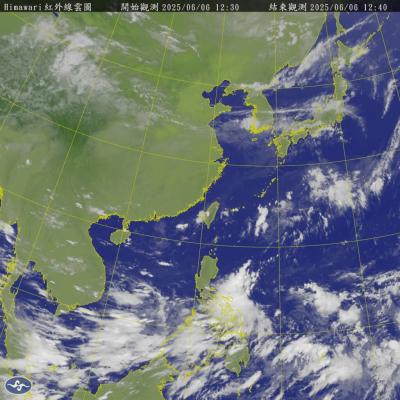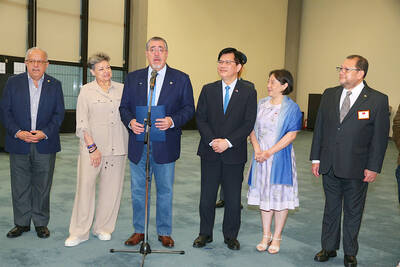A senior US Department of Defense official arrived in Taiwan on Tuesday to finalize arrangements for annual high-level security discussions, Taiwanese sources said yesterday.
The discussions, called the "Monterey Talks" because they take place in Monterey, California, were originally scheduled to be held on Sept. 13 and 14, but were canceled because of the visit to the US by Chinese President Hu Jintao (
However, after the cancelation was leaked to the media, and because of pressure from the US defense department, the US National Security Council held an emergency meeting in which it decided to declare that the talks had not been canceled altogether but "postponed" due to "scheduling conflicts," according to one Taiwanese official, who asked not to be named.
The US official, Dana White -- the country director for Taiwan in the Office of the Secretary of Defense -- arrived in Taipei on Tuesday to finalize arrangements for the resurrected talks, the Taiwanese official said.
Although the official would not release the dates of the new talks, he confirmed that they would take place, and added that he believed National Security Council Deputy Secretary-General Ko Cheng-heng (柯承亨) would be the most senior Taiwanese official attending.
In the past, the Monterey Talks have been chaired on the US side by an assistant secretary of defense, and the most likely candidate for this year's talks would be Assistant Secretary of Defense for International Security Affairs Peter Rodman.
The Monterey Talks are the highest-level security dialogue between the US and Taiwan, and have taken place every year since 1997. It is "the primary forum for addressing strategic concerns associated with the defense of Taiwan," according to one US defense expert.
"The last two meetings included bilateral war-gaming intended to facilitate coordination and reduce response time in the event of Chinese military aggression against Taiwan," the expert said.
This year's discussions are not expected to include issues like the stalled special arms-procurement budget, but are likely to focus on overall strategic concerns between the US and Taiwan, the expert said.
The fact that politicized issues such as the controversial budget were largely ignored during the talks was one of the reasons the dialogue was so important, he said, adding that the purpose of the discussions was to focus on the shared security interests of the two nations.
The special arms budget has become a sticking point in US-Taiwan defense relations, and many US commentators have pointed to the failure of the bill to move forward as evidence of Taiwan's lack of commitment to its security.
However, some experts say that issues such as the Monterey Talks point to an ongoing, robust defense relationship between Washington and Taipei.
For example, Gary Schmitt, executive director of the Project for the New American Century, and Dan Blumenthal, a research fellow at the American Enterprise Institute, wrote in a recent editorial in the Wall Street Journal that Taiwan was making a serious effort to bolster its defenses.
"From 1996 to 2003, for instance, Taiwan was the second largest recipient of arms purchased from the US," they wrote.
"Although it is true that defense spending as a percentage of Taiwan's GDP has declined over the past decade, the largest decline took place in the years when the [Chinese Nationalist Party (KMT)] was still in charge," they wrote.
"Taiwan's defense burden as a percentage of GDP -- at 2.4 percent -- is still greater than virtually all other American allies," they said.

Greenpeace yesterday said that it is to appeal a decision last month by the Taipei High Administrative Court to dismiss its 2021 lawsuit against the Ministry of Economic Affairs over “loose” regulations governing major corporate electricity consumers. The climate-related lawsuit — the first of its kind in Taiwan — sought to require the government to enforce higher green energy thresholds on major corporations to reduce emissions in light of climate change and an uptick in extreme weather. The suit, filed by Greenpeace East Asia, the Environmental Jurists Association and four individual plaintiffs, was dismissed on May 8 following four years of litigation. The

STAY AWAY: An official said people should avoid disturbing snakes, as most do not actively attack humans, but would react defensively if threatened Taitung County authorities yesterday urged the public to stay vigilant and avoid disturbing snakes in the wild, following five reported snakebite cases in the county so far this year. Taitung County Fire Department secretary Lin Chien-cheng (林建誠) said two of the cases were in Donghe Township (東河) and involved the Taiwan habus, one person was bit by a Chinese pit viper near the South Link Railway and the remaining two were caused by unidentified snakes. He advised residents near fields to be cautious of snakes hiding in shady indoor areas, especially when entering or leaving their homes at night. In case of a

A tropical disturbance off the southeastern coast of the Philippines might become the first typhoon of the western Pacific typhoon season, the Central Weather Administration (CWA) said. The system lacks a visible center and how it would develop is only likely to become clear on Sunday or Monday, the CWA said, adding that it was not yet possible to forecast the potential typhoon's effect on Taiwan. The American Meteorological Society defines a tropical disturbance as a system made up of showers and thunderstorms that lasts for at least 24 hours and does not have closed wind circulation.

DIPLOMACY: It is Guatemalan President Bernardo Arevalo’s first visit to Taiwan since he took office last year, while Eswatini’s foreign minister is also paying a visit A delegation led by Guatemalan President Bernardo Arevalo arrived in Taiwan yesterday afternoon and is to visit President William Lai (賴清德) today. The delegation arrived at Taiwan Taoyuan International Airport at 4:55pm, and was greeted by Minister of Foreign Affairs Lin Chia-lung (林佳龍). It is Arevalo’s first trip to Taiwan since he took office last year, and following the visit, he is to travel to Japan to celebrate the 90th anniversary of diplomatic relations between the two countries. Arevalo said at the airport that he is very glad to make the visit to Taiwan, adding that he brings an important message of responsibility